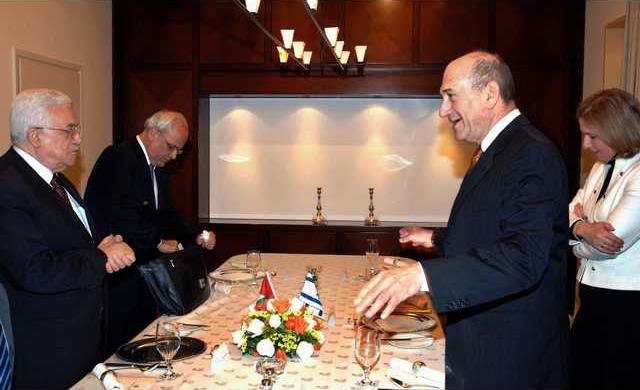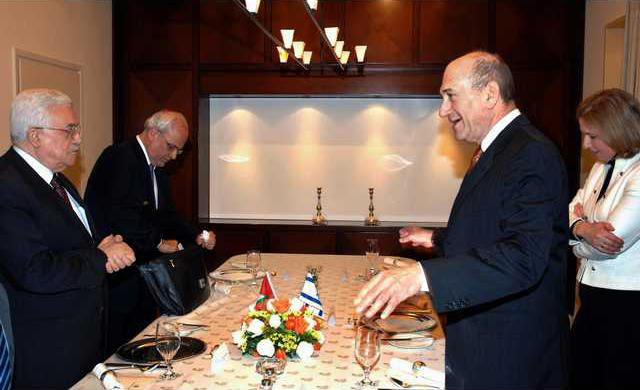RAMALLAH, West Bank — The Palestinians should follow Kosovo’s example and unilaterally declare independence if peace talks with Israel fail, a senior Palestinian official said Wednesday, but the Palestinian president said the proposal was premature.
The mixed Palestinian messages came a day after the latest meeting between Palestinian President Mahmoud Abbas and Israeli Prime Minister Ehud Olmert.
The two men formally relaunched peace talks at a U.S.-hosted summit in Annapolis, Md., last November. While the sides meet regularly, Palestinian officials have complained the talks are proceeding slowly and that President Bush’s goal of brokering a peace treaty in 2008 is not realistic.
Yasser Abed Rabbo, a Palestinian negotiator and top aide to Abbas, said in an interview Wednesday that the peace efforts ‘‘are going nowhere.’’
He said the Palestinians’ ‘‘first option’’ is success in the negotiations. ‘‘If this doesn’t happen, we have another option,’’ he said, noting Kosovo’s declaration of independence from Serbia earlier this week.
‘‘Kosovo is not better than Palestine,’’ he added. ‘‘If the whole world, the United States, the European Union, the majority of its states, have embraced the independence of Kosovo, why shouldn’t this happen with Palestine as well?’’
Abed Rabbo said the Palestinian leadership is discussing the proposal. However, Abbas reacted coolly to the idea, saying in a statement that he remained committed to reaching a negotiated peace agreement this year.
‘‘If we are unable to do that ... we will return to our Arab (brothers) to take the appropriate decision,’’ he said.
The chief Palestinian negotiator, Ahmed Qureia, quickly quashed the idea of a unilateral decision and said such a proposal was never discussed by the Palestinian leadership.
‘‘Decisions should be taken and then declared, and not be declared and then be taken,’’ Qureia told The Associated Press, in apparent criticism of Abed Rabbo.
Qureia said the negotiations with Israel are serious and are touching on all major issues, but concurred with Abed Rabbo that no progress has been made so far.
State Department spokesman Sean McCormack said Wednesday that Kosovo’s situation was unique.
‘‘The Israelis and the Palestinians have been trying for some time in the confines of the political process to try to work something out and come to an accommodation, a solution,’’ he said. ‘‘The international community has spoken to that, as well. We believe that there is hope in that process. It has not run its course.’’
Normally talkative Israeli and Palestinian officials have released few details on the status of their talks. Palestinian officials say the White House has urged the sides to maintain secrecy, fearing leaks could hurt progress.
Olmert also is wary of publicizing progress because a key coalition partner has threatened to pull out of the government if he makes any concessions on the issue of Jerusalem. If the ultra-Orthodox Shas party follows through on its threat, Olmert would lose his parliamentary majority.
‘‘We want these negotiations to succeed, and it is clear that if every detail of the discussions is in the public spotlight that will not be conducive to a successful negotiating process,’’ Olmert spokesman Mark Regev said.
The Palestinians already have declared independence before, in 1988, but the international community did not recognize the declaration. At that time, there was no territory under Palestinian control.
The Palestinians hope to establish an independent state in the West Bank, Gaza Strip and east Jerusalem — areas captured by Israel in the 1967 Mideast war.
Israel pulled out of Gaza in 2005, but maintains a large military presence and more than 100 Jewish settlements in the West Bank. Israel annexed east Jerusalem after the 1967 war and considers the entire city its undivided capital. Olmert has signaled a readiness for a large withdrawal from the West Bank and a pullback from parts of east Jerusalem under a final peace deal.
Israeli Foreign Ministry spokesman Arye Mekel rejected the notion of a unilateral declaration of independence.
‘‘Our policy is that we believe that such matters should be resolved in agreement and not by unilateral steps,’’ he said. ‘‘That’s why we are negotiating now and trying to reach an agreement.’’
Abbas and Olmert met for two hours Tuesday, including for one hour without aides, said Israeli government spokesman Mark Regev. Israeli officials said the two sides agreed to set up professional teams on some of the technical issues, such as water, the environment and the economy.
Talks have been troubled by continued Israeli construction in areas the Palestinians have claimed for a future state. Under the internationally endorsed ‘‘road map’’ peace plan, which is the basis of the renewed negotiations with the Palestinians, Israel is to cease all settlement activity.
Regev said the Israeli government is committed to its road map obligations. ‘‘There will be no new settlement construction and there will be no outward expansion of existing settlements,’’ he said.
The first phase of the road map also requires the Palestinians to dismantle militant groups. The Palestinians say they have made progress in this area, but Israel says they still have a long way to go.
The mixed Palestinian messages came a day after the latest meeting between Palestinian President Mahmoud Abbas and Israeli Prime Minister Ehud Olmert.
The two men formally relaunched peace talks at a U.S.-hosted summit in Annapolis, Md., last November. While the sides meet regularly, Palestinian officials have complained the talks are proceeding slowly and that President Bush’s goal of brokering a peace treaty in 2008 is not realistic.
Yasser Abed Rabbo, a Palestinian negotiator and top aide to Abbas, said in an interview Wednesday that the peace efforts ‘‘are going nowhere.’’
He said the Palestinians’ ‘‘first option’’ is success in the negotiations. ‘‘If this doesn’t happen, we have another option,’’ he said, noting Kosovo’s declaration of independence from Serbia earlier this week.
‘‘Kosovo is not better than Palestine,’’ he added. ‘‘If the whole world, the United States, the European Union, the majority of its states, have embraced the independence of Kosovo, why shouldn’t this happen with Palestine as well?’’
Abed Rabbo said the Palestinian leadership is discussing the proposal. However, Abbas reacted coolly to the idea, saying in a statement that he remained committed to reaching a negotiated peace agreement this year.
‘‘If we are unable to do that ... we will return to our Arab (brothers) to take the appropriate decision,’’ he said.
The chief Palestinian negotiator, Ahmed Qureia, quickly quashed the idea of a unilateral decision and said such a proposal was never discussed by the Palestinian leadership.
‘‘Decisions should be taken and then declared, and not be declared and then be taken,’’ Qureia told The Associated Press, in apparent criticism of Abed Rabbo.
Qureia said the negotiations with Israel are serious and are touching on all major issues, but concurred with Abed Rabbo that no progress has been made so far.
State Department spokesman Sean McCormack said Wednesday that Kosovo’s situation was unique.
‘‘The Israelis and the Palestinians have been trying for some time in the confines of the political process to try to work something out and come to an accommodation, a solution,’’ he said. ‘‘The international community has spoken to that, as well. We believe that there is hope in that process. It has not run its course.’’
Normally talkative Israeli and Palestinian officials have released few details on the status of their talks. Palestinian officials say the White House has urged the sides to maintain secrecy, fearing leaks could hurt progress.
Olmert also is wary of publicizing progress because a key coalition partner has threatened to pull out of the government if he makes any concessions on the issue of Jerusalem. If the ultra-Orthodox Shas party follows through on its threat, Olmert would lose his parliamentary majority.
‘‘We want these negotiations to succeed, and it is clear that if every detail of the discussions is in the public spotlight that will not be conducive to a successful negotiating process,’’ Olmert spokesman Mark Regev said.
The Palestinians already have declared independence before, in 1988, but the international community did not recognize the declaration. At that time, there was no territory under Palestinian control.
The Palestinians hope to establish an independent state in the West Bank, Gaza Strip and east Jerusalem — areas captured by Israel in the 1967 Mideast war.
Israel pulled out of Gaza in 2005, but maintains a large military presence and more than 100 Jewish settlements in the West Bank. Israel annexed east Jerusalem after the 1967 war and considers the entire city its undivided capital. Olmert has signaled a readiness for a large withdrawal from the West Bank and a pullback from parts of east Jerusalem under a final peace deal.
Israeli Foreign Ministry spokesman Arye Mekel rejected the notion of a unilateral declaration of independence.
‘‘Our policy is that we believe that such matters should be resolved in agreement and not by unilateral steps,’’ he said. ‘‘That’s why we are negotiating now and trying to reach an agreement.’’
Abbas and Olmert met for two hours Tuesday, including for one hour without aides, said Israeli government spokesman Mark Regev. Israeli officials said the two sides agreed to set up professional teams on some of the technical issues, such as water, the environment and the economy.
Talks have been troubled by continued Israeli construction in areas the Palestinians have claimed for a future state. Under the internationally endorsed ‘‘road map’’ peace plan, which is the basis of the renewed negotiations with the Palestinians, Israel is to cease all settlement activity.
Regev said the Israeli government is committed to its road map obligations. ‘‘There will be no new settlement construction and there will be no outward expansion of existing settlements,’’ he said.
The first phase of the road map also requires the Palestinians to dismantle militant groups. The Palestinians say they have made progress in this area, but Israel says they still have a long way to go.

